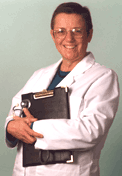
Treat Yourself to a Day of Health Though costly, a comprehensive medical assessment can ward off burgeoning health problems
Laura Bennett of Orlando, Florida, found a balance of old-fashioned caring and the latest technologies during a "day of health" spent at a women's health-assessment program. When the businesswoman turned 47, she signed up for the complete medical evaluation as a birthday gift to herself. "I hardly ever indulge myself, but I'm proud that I put the focus on my health instead of buying a new suit or something," Bennett says. "I would highly recommend it." Women receive more than routine blood work, screening tests, and a physical during a day of health. At Bennett's assessment, a dietitian reviewed a three-day food diary. Exercise physiologists measured body strength and flexibility. Mental health professionals delve into emotional, social, and stress issues. Although Bennett does not take any prescription medications, a pharmacist discussed vitamins and methods to keep cholesterol levels down. "This type of information is never on my radar screen," says Bennett. "Having someone explain it intelligently was a delight."
At the end of the day, with tests completed, women receive a written report and consult with a female physician who recommends lifestyle changes. Many diseases that plague women later in life are escapable with early intervention. "All the testing is geared toward preventing [disease] and a lot of the issues we deal with as we get older. If you can avoid those pitfalls, you can live a lot longer," says Deborah Harding, M.D., director of Executive Women's Health at Rippe Health Assessment, in Orlando. "We change people's lives here. We change what's going to happen." If Dr. Harding detects a condition that requires medical intervention, patients may follow up with their own physician or see an on-site specialist. Patients receive a written report they can pass along to their doctor. Many respected medical centers provide this type of "executive-health" evaluation, often offered as a perk to employees, and some, such as the Cleveland Clinic, offer a women's tract. But the programs appeal to more than corporate honchos. "Most women wear so many hats, they have a hard time getting the health issues taken care of for themselves," Dr. Harding says. "What they can do in this program is get everything done in a whole day." And there's no waiting. It sounds almost too good to be true. What's the catch? With the focus on prevention, evaluations are rarely covered by health insurance, and costs start at about $1,400. Typically diagnostics become "medically necessary" after symptoms appear. During a day of health, women may receive noninvasive tests they don't "truly" need, which therefore aren't covered by insurance. The irony is obvious, and somewhat maddening; these tests could give an early warning about osteoporosis or coronary artery disease. Bennett knows the results of her blood, heart, and bone-density tests and feels a sense of ownership. They'll serve as benchmarks in the future. She considers it money and time well spent and plans to make a health assessment an annual birthday present. Clearly, this isn't possible for everyone. But even if it's affordable only every few years, the benefits will last much longer. Related link:
Send feedback on this article. Debra Wood is a registered nurse and health writer living in Orlando, Florida. Debra calls on more than two decades of nursing experience to effectively communicate medical topics to lay and professional audiences. |












 odern
medicine, despite all its terrific scientific advances and treatments,
often leaves a nostalgic yearning for more -- perhaps not
among young people, but certainly among those of us old enough to
remember when a trip to the doctor seemed more like visiting an
old friend, with genuine queries about thoughts and dreams as well
as a head-to-toe exam.
odern
medicine, despite all its terrific scientific advances and treatments,
often leaves a nostalgic yearning for more -- perhaps not
among young people, but certainly among those of us old enough to
remember when a trip to the doctor seemed more like visiting an
old friend, with genuine queries about thoughts and dreams as well
as a head-to-toe exam. 